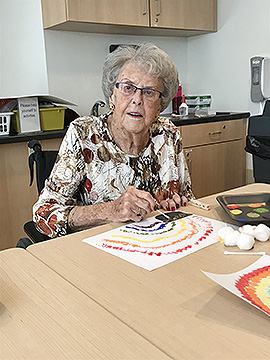News
Therapeutic Recreation
Therapeutic recreation delivers quality of life and health benefits to residents of long-term care
Date: 2019-04-16
Hazel Boorman is showing me around her room at Hogarth Riverview Manor (HRM), where a watercolour painting of poppies, a pressed bouquet of flowers from the long-term care home’s gardens, and a cloth penguin made out of socks share pride of place with family pictures and a framed needlepoint design she stitched and brought with her from her family home. "When I moved in, I said I was done with cooking and crafts," says Hazel. And while she’s still happy to let someone else do the cooking, she changed her mind and now looks forward to creating various arts and craft projects. "It’s just fun to do. I like to try things and say to myself, I’m 96 years old and I did it. And then when my girls come to visit, they say, ‘mom, that’s wonderful.’ It keeps me busy."
Crafts like the penguin and the poppies are part of the many therapeutic recreation activities that happen seven days a week at HRM. "Therapeutic recreation is a holistic way to work with people," notes Nikita Cava, a therapeutic recreationist at HRM. "People in long-term care can’t always express with words the things that they need, so it’s almost like finding a new language and finding new ways to meet the needs of people who have barriers to leisure."
When each resident comes to HRM, a therapeutic recreationist gets to know them a little better with what’s called a "look into my life" assessment that covers everything from where they grew up and where they once worked to what their leisure interests are and what languages they speak. This information helps therapeutic recreationists develop interesting, engaging programs for residents. Every month, residents can also contribute ideas for the next month’s calendar (which is why many enjoyed a "pancake bar" set up with berries, chocolate chips and other fixings on Pancake Tuesday).
Residents can participate in a range of activities of their choice. Singing, music, and arts and crafts are popular, as are weekly visits from St. John Ambulance-trained therapy dogs and summertime "barnyard friends" events with kittens, goats and chickens in the courtyard. There are seasonal events with kids, like a Halloween parade, Easter egg hunt or a Family Day "daytime sleepover" where grandchildren and great-grandchildren can come in their pjs to watch a movie and eat popcorn.
Daily or weekly activities include card games and bingo, religious services, and simple exercise groups, like tossing a ball around, balloon badminton or a walking group. Master gardeners visit year-round for indoor and outdoor gardening, and the main therapeutic garden is filled with edible plants that engage the senses with colour, texture and scents. For residents who are unable or unwilling to leave their room, there are one-on-one visits, with reading, a simple hand massage or "reminiscence therapy," chatting or looking at pictures of the resident’s earlier life. "We’re always looking for ways for residents to be engaged," says Cava. "You don’t want someone to come to a program and just to sit there. We really aim for the staff to be interacting with the residents and make sure they’re enjoying their time."
All these activities are about enhancing quality of life, which also translates to physical and mental health benefits. "Therapeutic recreationists give us insight into what the residents are doing day to day. Because they spend a lot of recreational time with the residents, they can often alert us to changes in condition and sometimes give us clues as to what’s going on," says Dr. Aaron Feldstein, a family physician with St. Joseph’s Care Group. As well, if residents have dementia or another cognitive condition, feeling discontented physically or psychologically can result in "responsive behaviours" like agitation, yelling or aggression, he adds. "These behaviours can be like a big puzzle and we try to look at it from every angle. Therapeutic recreationists help us get a sense of the whole person and tap into the things they enjoy."
As I say goodbye to Hazel, she takes me down the hall to the activities room, which has shelves of books, a jigsaw puzzle laid out and baskets of art supplies. We don’t stay too long though: there’s a birthday party about to start and the band is tuning up.

